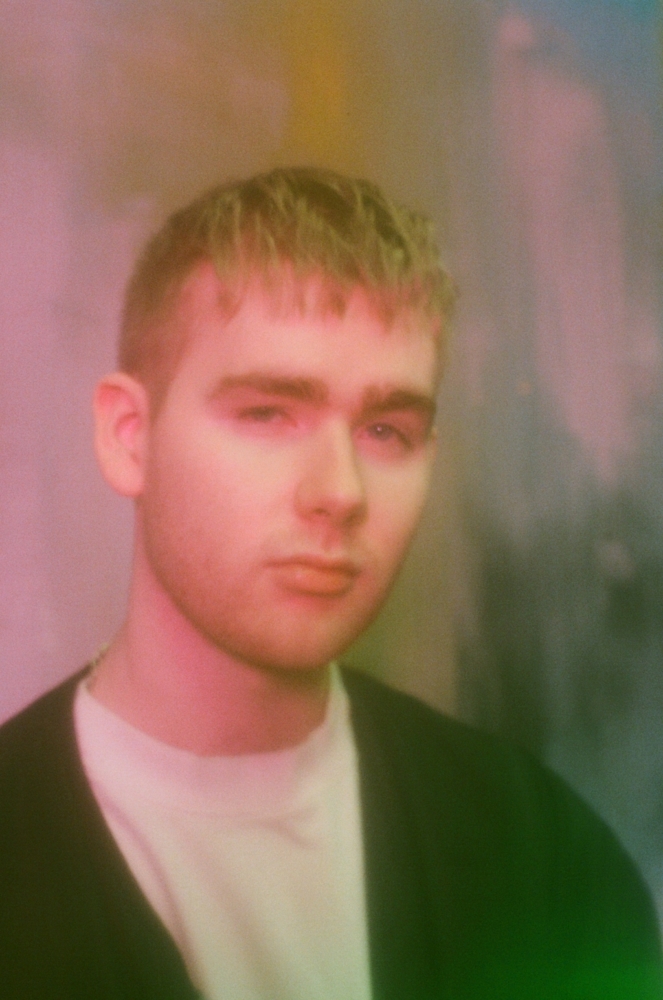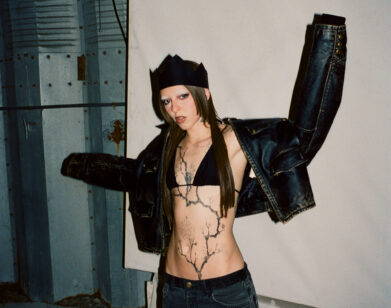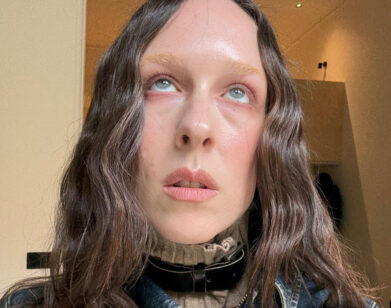Clairo and Mura Masa On the Agony and Ecstasy of Being Young

Photo by Darcy Haylor.
The sophomore album. For many musicians, especially ones who’ve tasted success with their debuts, it can be fraught territory. What do you do for an encore? Do you meet expectations and give fans more of the same, or do you subvert them by trying something new? For Alex Crossan, it was the latter. Performing under the moniker Mura Masa, Crossan established himself as an electronic-music wunderkind, producing and remixing records for other artists. His 2017 self-titled debut was a mish-mash of sub-genres—dubstep, disco, house—and featured vocals from the likes of Charli XCX and Christine and the Queens. Even though the album was self-titled, Crossan was very much playing the role of producer.
For his follow-up, Crossan made the bold move to switch it up. R.Y.C, which stands for Raw Youth Collage, sees the 23-year-old musician following his blueprint of collaborating with of-the-moment vocalists, but this time, instead of providing them with a frenetic backdrop of synthetic sounds and programmed beats, he’s taken a more analog approach. Not only is the record steeped in guitar, but Crossan himself contributes his own vocals on most of the songs, making R.Y.C feel more akin to a new wave rock album than the club-ready music he’s known for. But the nostalgia goes well beyond the sound. R.Y.C stands as Crossan’s thesis statement on his generation’s tendency to romanticize the past, and why looking backward may not be the best way to move forward. Crossan recently connected with the musician Clairo, who appears on his track “I Don’t Think I Can Do This Again,” to talk about the spontaneity of their collaboration, how the internet shaped their youth, and customized Instagram face filters. —BEN BARNA
———
CLAIRO: How does it feel to have your album out in the world?
ALEX CROSSAN: It feels like raising a child and then the child starts to hate you, and then all you do is argue until the end of your relationship, and then your child leaves home and goes and does its own thing and makes something of itself, and then you start to regrow your relationship from a distance. That’s what I think.
CLAIRO: I’d say that’s pretty accurate to the album process.
CROSSAN: I’m sure you felt the same.
CLAIRO: I’ve definitely felt the same. You said before that the album is heavily focused on nostalgia and reminiscing on your teenage years. Was there one specific moment that made you decide to make the album about nostalgia?
CROSSAN: There wasn’t really a single moment, but it was kind of just noticing the people around my age and younger had this propensity to rely on throwback shit to make themselves feel better. Every movie is a reboot or a sequel. The whole culture is just completely infantilized and everyone’s trying to feel like a kid again. Myself included. I was just playing a bunch of old video games and watching old movies and shit like that, and listening to old, old music, and I was like, “Why is everybody doing that?”
CLAIRO: Would you say you enjoyed your teenage years? Did you enjoy high school? I feel like I enjoyed it, but I also equally didn’t enjoy it.
CROSSAN: I think everybody has that experience. Nobody’s just like, “Yeah, I had a fit time at school. It was amazing the whole time.” I think everybody had this weird mix of pubescent rage and sadness, and just pure mania and joy. It’s a really weird time. But at the tip of that, it kind of has this weird melancholic, bittersweet feel to it, and I feel like that’s a really conscious thing to try and write about.
CLAIRO: It almost feels like you’re experiencing the extreme of every emotion.
CROSSAN: You’re getting to grips with how far you can feel, but about really stupid shit, like exams or romance and stuff like that.
CLAIRO: I feel like we saw a lot more of you as a person, or as an individual, on this album. We could hear you sing and tell stories and become vulnerable with the world. Was that something that was important for you this time around?
CROSSAN: Being from a background of dance music and what you might call club music or electronic music, I think something that gets neglected in that scene is personal vulnerability. I think there’s a huge pivot in popular music, and just in culture in general, towards art that is vulnerable and emotionally honest. I think that’s why your album is so good, because it just cuts through as a kind of personal diary.
CLAIRO: Well, thank you.
CROSSAN: I feel like there’s a real desire for that within music right now. That’s why you get someone like Billie Eilish. She’s insanely popular and talking about her own life.
CLAIRO: Yeah, that’s amazing. And thank you for saying that about my album. That’s so nice. I’m getting kicked out of where I was interviewing you. I was interviewing you in a warehouse and I just got yelled at.
CROSSAN: Oh shit. Well, it adds color to the interview, I guess.
CLAIRO: My favorite song on the album is “Today” featuring Tirzah. Tell me how that happened.
CROSSAN: I’m a huge Tirzah fan, first of all, and she’s not a very easy person to get ahold of.
CLAIRO: I think I’m her biggest fan.
CROSSAN: She’s an enigma, really, and it’s kind of by design. That’s just the kind of person she is. I had wanted to work with her for ages but had put it off actively, just because I respect her too much to reach out and try and barge into her world. But just by a happy coincidence, we ended up working with the same people on our management teams, so I ended up getting to meet her, and I managed to convince her to be on my album. That song was the result of two or three hours of conversation, and then just an hour with the microphone on, and this kind of meandering around on the guitar, recording a bunch of improvised lines and lyrics, and then I took it home and put it together like a jigsaw. It’s definitely one of my favorite moments on the album.
CLAIRO: Sounds like the best way to make music, just recording your experience with another person and seeing what you get from it, and then arranging it in a way that feels natural. That’s the best.
CROSSAN: That’s how she normally works with Mica Levi, and I find it to be such an interesting way of working.
CLAIRO: How did the internet shape your youth?
CROSSAN: Hm, this is an interesting question coming from you. I think you’re far more qualified to talk about this than I am.
CLAIRO: I’m not answering the questions, you are.
CROSSAN: I always viewed the internet as a kind of telescope. It’s a way of seeing these amazing, far-off things that you don’t necessarily have to be socially IRL involved with, but it’s a way of getting a glimpse into different worlds. I know it’s especially true for me, because I grew up in Guernsey, which is a tiny island off the coast of France. There were no good venues. We used to put on nights in pubs and stuff, but it was nothing like London or like any burgeoning scene in America. It’s a lovely place, but it’s not very in tune culturally. I think being from a place like that is actually super beneficial, just because it gives you such an interesting outsider view. Like when I came to London, I didn’t understand how the fuck to have good taste or where to find new music. I didn’t know you could just go to a museum and see art, or go and see a rock band. At first, it felt kind of limiting and I felt kind of outsider-y, but I’ve come to realize it’s actually a great strength to have that outside perspective. It just makes you more interesting.
CLAIRO: I don’t know what I would do without the internet, honestly. It did much more for me than I understand. Do you think that it’s important to look back at our adolescence and our childhood? We have to look back to understand where we are now, but how do we look back without romanticizing it? I’m giving you essay-question realness.
CROSSAN: That’s kind of the question that the album is asking. I try not to come to a conclusion on it on this album just because I want people to mull it over themselves, and I think music that’s prescriptive like that is kind of preachy. But my personal view on it is I think it’s so important to recognize the cycles. It’s just a part of who we are as human beings to try and make sense of how we got to where we are and what our stories are.
CLAIRO: Yeah, exactly.
CROSSAN: I think it’s important. There is maybe a danger of dwelling on the past, but I think that’s far less dangerous than moving forward without learning and not being able to find joy in happy memories and things like that.
CLAIRO: It’s hard not to romanticize it. I feel like romanticizing almost everything after it’s passed.
CROSSAN: You’re a musician, so. That’s what we do.
CLAIRO: It’s tough, but we’re getting there. I feel like this album has moments that are really vulnerable, really bittersweet and soft and intimate. But then there’s moments of undeniable pop music, like the song with Georgia or our song that made you kind of feel like losing yourself a little bit. Do you think that’s an important balance in adolescence?
CROSSAN: Definitely. There was another interview that I was doing and someone asked me, “Is it more important to have vulnerability, or is it more important to have hedonistic joyfulness?” And my answer was just like, “Why not both?” I think the most powerful music is when you can achieve all of those things at once. Like the Georgia track, particularly. It’s based on this very sweet platitude of “live like we’re dancing,” which feels like quite hollow club music, the hook, but there’s a message there. If you can say something real while allowing people to escape from something real, I think that’s where you get this really magical space in music.
CLAIRO: I think you did something really special with this record, though. It’s hard to capture those small moments, or someone telling a story about how they got caught having sex. It’s hard to capture that, but then also have something like “Live Like We’re Dancing,” or “I Don’t Think I Can Do This Again.” It’s a very ballsy move on your part, and I think it’s so sick, because not a lot of people would be okay with going so extreme in both directions. It’s kind of like what we were talking about earlier—teenagers feel in extremes. That’s how your album feels.
CROSSAN: That’s very sweet of you to say. I think there was a huge risk on this record of doing all the wrong things, getting the wrong moments, not being tasteful, and making this weird pastiche that felt immature and teenager-y. That was a big risk, and it was something that really worried me the whole time I was making it. But I think I struck a good balance, or just came to terms with what I was actually doing and what that would sound like.
CLAIRO: It didn’t feel out of place once. Even when there were small moments or big moments, I think it really captured what it feels like to get ready for a party when you’re a teenager, or when you’re riding your bike in your home town, or when you’re drunk. There’s so many emotions and memories that came from the songs I heard, and it’s crazy because they’re all new songs that I don’t even have any sort of memory attached to yet that they just brought me to. It’s a big moment.
CROSSAN: We’re from completely different places, we are slightly different ages, but it’s interesting to me that you feel that same sense of whimsy or bittersweetness or nostalgia that I do for writing the songs.
CLAIRO: Maybe it has to do with us sharing similar influences. I don’t even know where that comes from, but I feel like nostalgia is a very specific sound, and you nailed it. You got it down.
CROSSAN: I did it.
CLAIRO: What are you most proud of?
CROSSAN: I’m proud that I did what the hell it was I set out to do, more than anything, and how much of a risk that was for me. I was in a very strong position after the first album. I developed a certain sound, it was very popular, and had some financial success. So for me to turn around and be like, “I’m going to do something completely different, just because that’s what I feel like doing and that’s what I feel like is essential for this music right now… ” Internally, with people who work with me, the reaction to that was like, “Well, we trust you, and do whatever you want, but also, are you sure you don’t just want to go and do the same thing?” So I guess I’m just proud that I was able to stick with that and make something that actually reflects what I wanted to do.
CLAIRO: That’s super important. I’m in a position right now where I’m working on my second record, and I’m trying to do exactly what I want to do, and I don’t know if it’s going to sound anything like the first one, but I think that that’s what’s so important about making records as a whole, is that you create a whole world and that’s the only place it’s ever going to exist.
CROSSAN: Just have fun making your record and don’t worry about anyone’s expectations going in.
CLAIRO: It just feels like you’re having so much fun making it.
CROSSAN: It was a lot of fun. I remember when we were talking about “I Don’t Think I Can Do This Again” and me sort of suggesting coyly, “You should just fucking shout something.”
CLAIRO: I remember when you told me to yell something. I was like, “Wait, what?” But then we got it. I sent you one recording of what I just had started writing, and then you just went off and that was it. It was incredible. I like that the process of our song was really spontaneous.
CROSSAN: I tried to keep that process the same, just as few meetings as possible. As spontaneous as I could get it, that’s how I kept it.
CLAIRO: I don’t think there’s any better way to collaborate. If it’s not fast, then it’s not worth doing.
CROSSAN: When are you going to ask me what my favorite randomizer Instagram face filter is, because that’s all we do in our online communication, just send each other videos of us.
CLAIRO: How do you feel about Instagram filters? The ones where it chooses your face?
CROSSAN: I feel good about them. I feel like they really speak to a generation of people who don’t know what they want to be. Why not have a face filter tell you that you’re Sully from Monsters Inc.? Why not?
CLAIRO: For viewers at home, this is how Alex and I have been communicating for the last month. We’re always sending these back and forth to each other. I think we’ve literally used every single one that’s available on Instagram.
CROSSAN: I still think that you should have made one of those face filters, but with pictures of your face using the reaction pictures with you on Twitter. I think that would’ve been good.
CLAIRO: I think that would be the worst thing ever and I’m so happy that I’ve never done that. Maybe we’ll make a Mura Masa one.
CROSSAN: “Which nostalgic memory are you?”






